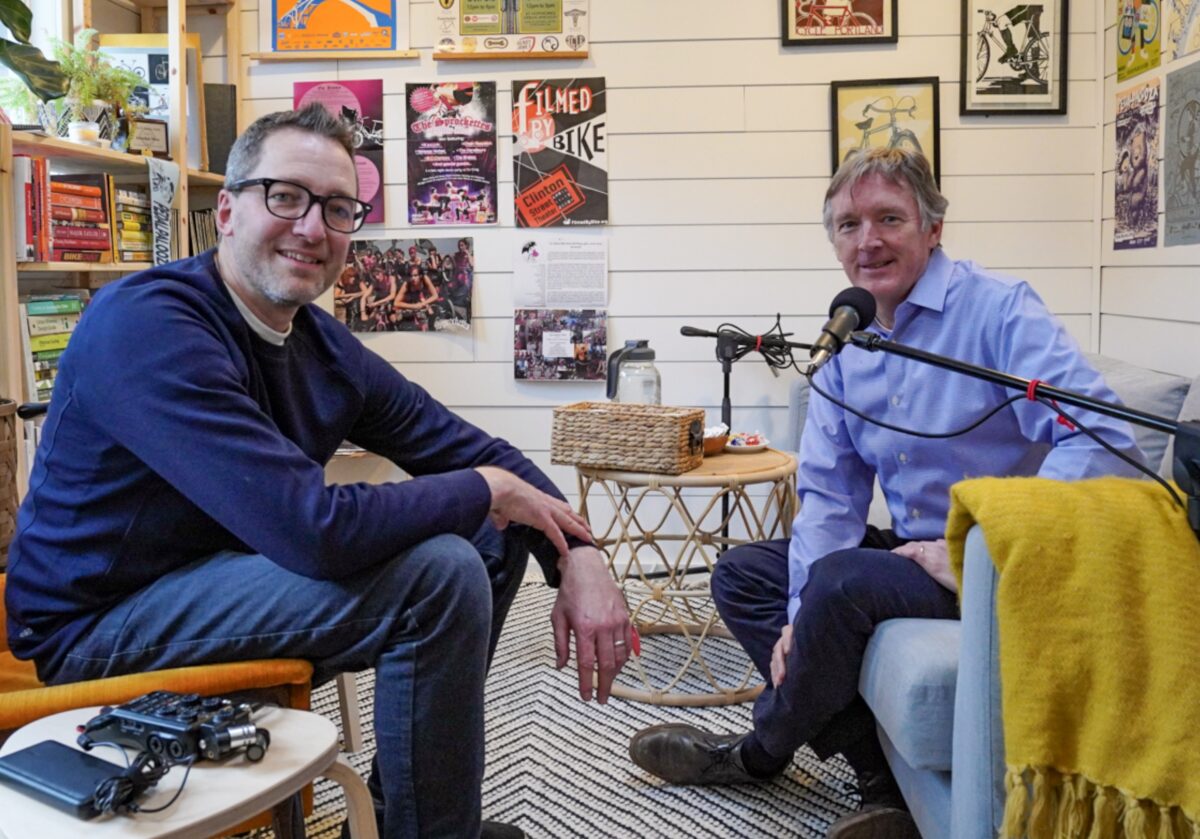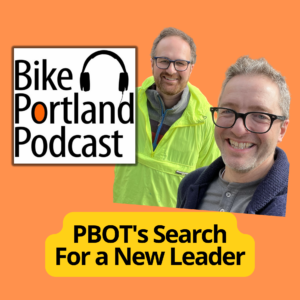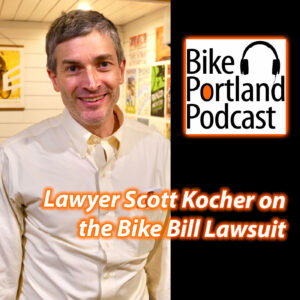As a veteran of Metro Council (Portland’s regional planning authority) — including a seven-year stint as president from 2003 to 2010 — David Bragdon has been around the block when it comes to Oregon transportation politics. And for the past decade he’s been executive director of TransitCenter, a nonprofit foundation that funds and conducts research and advocacy to improve public transit across the U.S. Before that he led a planning office for former New York City Mayor Michael Bloomberg.
Suffice it to say, Bragdon has a mix of experiences in advocacy and government that I feel BikePortland readers could learn a lot from. So when I heard he was leaving his post at TransitCenter and was making a stop in Portland to visit family, I figured it was a perfect time to invite him into the Shed for an interview.
I hadn’t talked with Bragdon since I stayed at his apartment in Brooklyn after Hurricane Sandy in 2012, so I wasn’t sure what direction our conversation might go. Many of you are likely aware of Bragdon’s sharp criticisms of the Oregon Department of Transportation (which he insists on calling the Oregon State Highway Department). I opted to not rehash all of that (although we do touch on ODOT’s Portland megaprojects). Instead, we talked about a range of issues including: how advocates can influence government, what PBOT should look for in their hiring of a new director, PBOT’s budget woes, why he doesn’t trust ODOT, TriMet and transit governance, and more.
A few highlights:
- Bragdon said his biggest regret from his 12 years at Metro is allowing himself to be “duped” by ODOT’s dishonesty.
- He makes the case for why Metro should take over a leadership role of TriMet.
- His opinion on transit enforcement and why he thinks there’s a roll for armed police response.
- Why he thinks the plea of “We are out of money,” from PBOT is not a good strategy.
- Why he thinks PBOT staff and the quality of TriMet’s bus service deserves more credit than it gets.
Listen to the episode in the player above or wherever you get your podcasts. And make sure to subscribe so you get the latest episodes first. Note that I’m leaving for vacation tonight, so the podcast will take a break for a few weeks. Expect fresh episodes the first week of March. Thanks for listening.








Thanks for reading.
BikePortland has served this community with independent community journalism since 2005. We rely on subscriptions from readers like you to survive. Your financial support is vital in keeping this valuable resource alive and well.
Please subscribe today to strengthen and expand our work.
Really interesting chat and worthwhile listen.
While not discussed directly, the leadership void from Mayor Wheeler on transportation issues has not helped the city demonstrably move the needle in the past 6 years. The pod underscored the importance of political will.
Another distinction discussed was the difference between the business elites in Seattle and Portland, and how the Seattle business folks were more progressively engaged with transportation issues.
Wow, reasonably tears apart our neighborhood association system in one sentence. I got to know David when working on his campaign for Metro president. I still dream about him moving back and running for mayor.
Great interview and perspectives.
Wow, even David thinks that the Devil has come down to the Rose Quarter, or at least the Columbia River.
Very interesting discussion. It is fascinating to hear David Bragdon speak about his perspective some 15 years after serving as Metro Council President.
But I found the conversation lacking in substantive solutions to the core problems Bragdon accurately identifies:
I heard that claims austerity or the lack of adequate transportation funds are often simply false and provide political cover for a gross misallocation of available public resources toward vehicles and highways relative to bikes, pedestrians and transit.I heard Portland has good, smart staff who often want to and have the skills to implement a more balanced transportation system.I heard that there the most elected officials and staff are well-intentioned but operate in broken structures or systems that produce bad outcomes; fundamentally Bragdon says we face a governance problem.I also heard that dominant form of civic participation (neighborhood associations) have out lived their usefulness as channels for real change and mainly represent the same privileged groups that benefit from a failed status quo.But I also heard more local or regional “accountability” could improve priorities and result in improved outcomes.Finally, I heard that fraying social bonds in the United States create many of the challenges to expanding public transit, and this has impacted to Portland too.But most of Bragdon’s solutions seemed entirely inadequate to meet these challenges. He seemed to largely argued for better leadership and maybe the insertion of better more accurate information into decision making in order to inform better decisions and “to affect public perceptions.”
The only real structural reform Bragdon mentioned was putting Trimet under Metro; a reasonable idea to increase local and regional accountability but given the scope of the other structural and system governance problems is that really sufficient?
It certainly doesn’t address a system and narrative of alleged austerity for the transportation system we need (more bikes, pedestrian infrastructure, and transit) and relative abundance of public funding for the transportation system we really don’t need (highways and vehicles)?
Seems like that’s we have been trying for decades to elect better leadership and bury public officials with better information and we are still stuck in a failing status quo.
I was really hope that Bragdon might connect the problems he identified with and with more substantive structural solutions centered on public budgets: how we affect or change the public finance decisions that continue to fund a failing, toxic, and imbalanced transportation system while maintain the “austerity” narrative.
If we want to really change outcomes, it seems to me we need to access and change the budget decisions that drive those failed outcomes. That seems to be central part of the systemic/structural transformation in governance we urgently need both because it affects the real sources of power.
I don’t know how you can address these both these problems without democratizing the budgets and budgeting- in process and outcome- in a way that brings people together to more directly shape and control outcomes at the local, regional and state level. And democratizing decision making can also help address over time, people’s sense of alienation (i.e. fraying social bonds) to each other and to government.
In the short term democratizing budgeting may not guarantee all the outcomes we want to see; but it in many cases it will expand the opportunities to shape different outcomes (and surely will in many more). More importantly it will give advocates and communities outside City Hall a chance at directly driving outcomes, shift the narrative, and mobilize more grassroots advocates on the outside… to build a movements informed and motivated by the actual problems people in the community face.
Brandon is a brilliant guy and anyone who knows him personally knows he also has a hilarious sense of humor that combines sharp biting with a strong sense of empathy and- and I would say- kindness/humanity. But I think he brings an insider perspective that has its limits in connecting inside and outside strategies for the structural changes I think he accurately identifies.
This is a really great comment! I agree with the summary of the problem and with your critique of a proposed solution being basically superficial.
It certainly doesn’t address a system and narrative of alleged austerity for the transportation system we need (more bikes, pedestrian infrastructure, and transit) and relative abundance of public funding for the transportation system we really don’t need (highways and vehicles)?
Seems like that’s we have been trying for decades to elect better leadership and bury public officials with better information and we are still stuck in a failing status quo.
This! There is so much information and data out there, truly we have what we need to make decisions that would lead to safer streets and more environmentally responsible transportation policies but we (waving hands widely to encompass the state) hide behind the legislature, the bureaucratic structure, fund limitations etc.
One thing to add to this nuanced and interesting comment that I struggle with articulating myself is the role of public input. I believe the public should have a say in what they want in their communities. However there’s a big gap between what people want and what people see that limits our (again, waving hand widely at all of us) ability to give feedback in a way that would actually lead to the goal.
By this I mean it’s hard to imagine what we don’t already see. Most people want the quickest way from their home to some destination. For those that grew up in most of America, that means how easy and fast can I make my driving experience. For some folks who’ve lived in big cities w/big transit systems, we can see how better transit can also get us there but if a person hasn’t experienced that, or thinks it’s just too much of a lift (politically and financially) to get us there (say in Portland), they will still fall back to ‘well still, we need to focus on driving.’ For some folks that have lived and/or visited in cities outside the US, we’ve seen how vastly different transportation as a whole can be in both very dense populated areas and the rural and suburban areas in between. But again there’s a limit to how much we can use other examples for our own homes.
That’s where i see a potential gap in participatory budgeting. Maybe the idea of fashioning the budget towards goals of environmental sustainability, repairing harm done to intentionally excluded communities, and safely traveling around the area would bridge some of that gap. I firmly hope I am wrong about this but there is benefit in having expertise in technical areas like designing streets and planning cities that can be drowned out by a public that doesn’t (and maybe fairly) believe we can have a city that is vastly different than what we have currently.
I don’t want the quickest way home. I want the safest way home.
I don’t want a convenient way home. I want a useful way home.
I don’t want an efficient way home. I want the most interesting way home.
I don‘t want the dirtiest way home. I want the most comfortable way home.
I hope David Bragdon returns to Portland. maybe he should be ODOT director…
Here are the things he said that were memorable to me.
The indispensable ingredient is residents who care, and who organize and who do pressure the political system. A mayor that backs their staff. Winning Transit. Safe routes for Seniors. Put safety first. Money is in the wrong hands being spent on the wrong things. Overhaul the governance. How are we going to make people’s lives better with the money that we do have?
(BTW: here is PBOT’s requested budget: https://www.portland.gov/cbo/2023-2024-budget/documents/portland-bureau-transportation-fy-2023-24-requested-budget/download)
ODOT director Strickler is living in 1956 if he doesn’t believe in induced demand. ODOT lied to Metro.
Portland is not immune to the things that are happening writ large in the United States. The way people are driving is more anti-social and dangerous.
There is a role for law enforcement, but it is not the only answer to every problem.
How do we enable our citizens to lead a car free lifestyle and free our residents from the onerous financial costs of owning, operating and insuring a car. common payment and far interchangeability. Probably do some consulting…